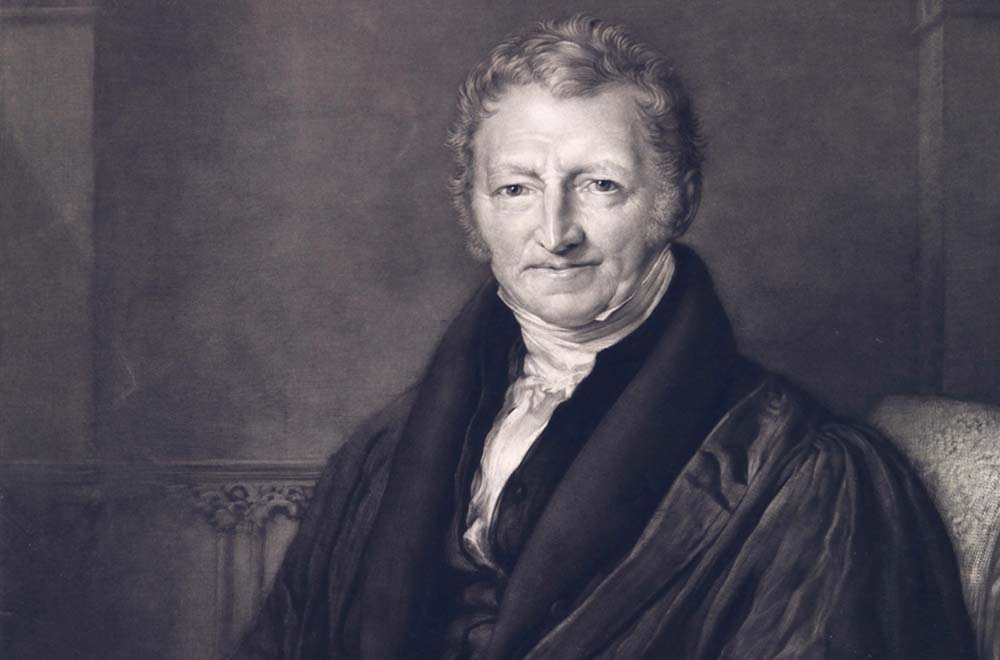Download (PDF, 5.59MB)
INTRODUCTION
Malthus’ Essay on The Principle of Population
T.R. Malthus’ Essay on The Principle of Population, the first edition of which was published in 1798, was one of the the first systematic studies of the problem of population in relation to resources. Earlier discussions of the problem had been published by Boterro in Italy, Robert Wallace in England, and Benjamin Franklin in America. However Malthus’ Essay was the first to stress the fact that, in general, powerful checks operate continuously to keep human populations from increasing beyond their available food supply. In a later edition, published in 1803, he buttressed this assertion with carefully collected demographic and sociological data from many societies at various periods of their histories.
The publication of Malthus’ Essay coincided with a wave of disillusionment which followed the optimism of the Enlightenment. The utopian societies predicted by the philosophers of the Enlightenment were compared with reign of terror in Robespierre’s France and with the miseries of industrial workers in England; and the discrepancy required an explanation.
The optimism which preceded the French Revolution, and the disappointment which followed a few years later, closely paralleled the optimistic expectations of our own century, in the period after the Second World War, when it was thought that the transfer of technology to the less developed parts of the world would eliminate poverty, and the subsequent disappointment when poverty persisted.
Science and technology developed rapidly in the second half of the twentieth century, but the benefits which they conferred were just as rapidly consumed by a global population which today is increasing at the rate of one billion people every fourteen years. Because of the close parallel between the optimism and disappointments of Malthus’ time and those of our own, much light can be thrown on our present situation by rereading the debate between Malthus and his contemporaries.
Famine, disease and war
Malthus classified the checks to population growth as preventative and positive. Among the preventative checks he mentioned late marriage, and what he called “vice”. This included birth control, of which he disapproved. If he had been living today, I think that Malthus would consider birth control to be the most humane method for preventing excessive growth of population.
Among the positive checks to population growth, are the three terrible Malthusian forces, famine, disease and war. Today, each of these has taken on new and terrifying dimensions, and in this book, a chapter is devoted to each.
Was Malthus wrong?
Many people maintain that because both our food supply and the global population of humans have grown so enormously, Malthus was wrong. However, I believe that we still must listen to the warning voice of Malthus. The fossil fuel era is ending, and with it, the possibility of Green Revolution agriculture. Population growth, climate change and the end of the fossil fuel era may combine to produce a famine of completely unprecedented proportions by the middle of the present century.
The climate emergency
The threat of catastrophic climate change came to the attention of scientists after the time of Malthus. However, this existential threat to the future of human civilization is connected to Malthus’ work by the fact that one of the driving forces behind climate change is population growth.
Our footprint on Nature’s face has grown too large
At present, the total human economy is demanding more from the environment than the environment can regenerate. If we go on with business as usual, then within a decade it would take two Earths to regenerate the resources that we collectively demand. Most economists are focused on growth, but endless growth of anything physical on a finite planet is a logical impossibility. We need a new economic system, a new social contract, and a new and more considerate relationship with our environment.
Read the entire book above or download it here.
We thank John Scales Avery, a renowned intellectual, EACPE board member, and theoretical chemist at the University of Copenhagen, for giving us permission to reproduce his latest book for EACPE.


